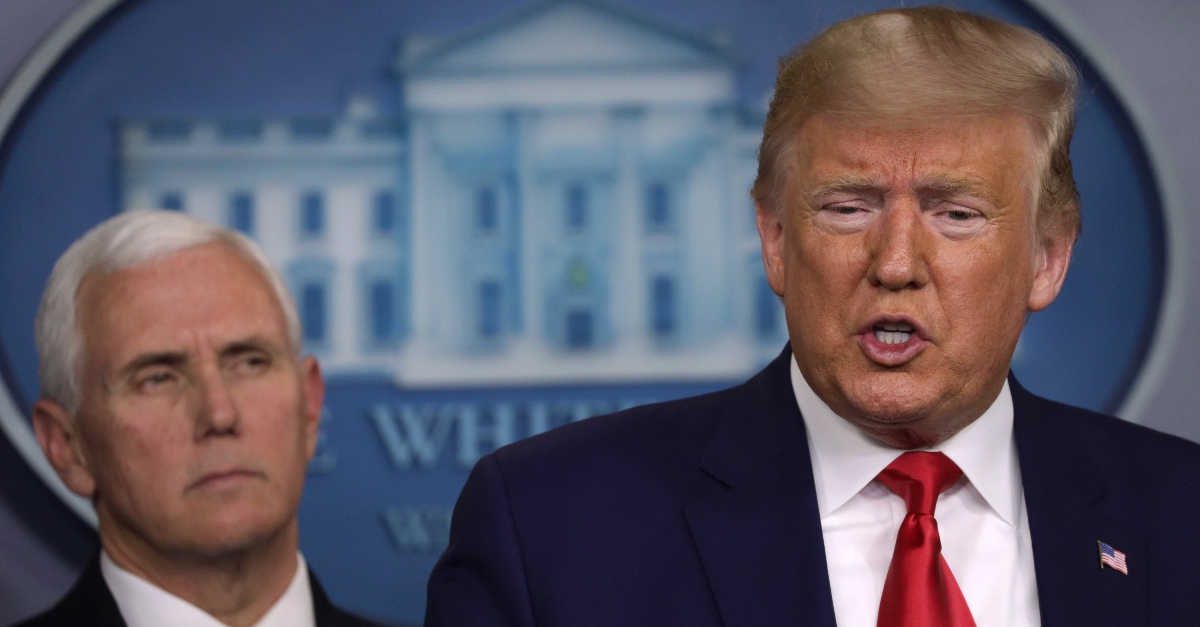
President Donald Trump on Saturday said that he’s considering taking steps to quarantine New York, New Jersey, and Connecticut–where COVID-19 has continued to spread at alarming rates despite statewide social distancing measures. The Trump tweet sparked immediate discussions among legal experts as to: whether the president of the United States has the authority to order an entire state or states to quarantine; what laws could be interpreted as authorizing such a drastic measure; how the courts may ultimately decide the issues.
Here are some of the scenarios most likely to play out if Trump attempts to order a statewide quarantine.
Authority to Control Communicable Diseases
Professor Bobby Chesney, an associate dean at the University of Texas School of Law, wrote Saturday that the president might cite to 42 USC § 264(a), which empowers the Surgeon General to authorize such regulations which “in his judgment are necessary to prevent the introduction, transmission, or spread of communicable diseases […] from one State or possession into any other State or possession.”
The statute also provides that infected individuals “may be detained for such time and in such manner as may be reasonably necessary.”
The question then becomes whether the courts would consider a statewide quarantine to be “reasonable” in light of the underlying facts.
“Courts are going to defer to a considerable extent, I’m quite sure,” Chesney wrote. “Might Trump still lose in court if there’s enough evidence he’s acting instead out of spite vs. political opponents? In theory, sure, but as Travel Ban litigation showed, that’s a difficult pathway. Meanwhile, might there at least be a stay? There’s irreparable harm both ways, alas. I’d bet on the health interest prevailing for stay purposes, but who knows.”
Law&Crime previously reported on the administration’s power under this statute and how it is derived from the Constitution’s Commerce Clause.
Chesney also noted that, regardless of the administration’s legal justification, enforcement of such an order would likely require mobilizing the military.
“Meanwhile, perhaps the most interesting question of all is: how to enforce a federal quarantine across such large areas? Gonna need the military for that. Will Trump federalize NY’s National Guard, or units from others? Buckle up!” he said.
Authority to Overcome Inadequate Local Control
Professor Stephen Vladeck of the University of Texas School of Law, on the other hand, suggested that the presidential power for quarantining a state could come from 42 CFR § 70.6, which states that if the director of the Center for Disease Control and Prevention (CDC) determines a state has taken measures “insufficient to prevent the spread” of a communicable disease, the director may impose such “reasonably necessary” restrictions.
“If quarantining an entire state is the only way the government can prevent those within that state from spreading the disease to those outside, it’s a non-frivolous interpretation of § 70.6(a)(2),” Vladeck wrote.
However, the law professor also pointed out that the federal government would only be able to invoke such restrictive measures due to its own failure in responding to the global pandemic.
“Note, though, how that reading depends upon the absence of less restrictive means,” he wrote. “If we were better prepared for this—or were in a better position to conduct comprehensive surveillance testing—there’d be even less of an argument for this kind of measure. The irony of the slow federal response is how it could help justify *more* restrictive measures now.”
What New York’s Governor Has Said
Asked about the president’s considerations on Saturday, New York Gov. Andrew Cuomo (D) adamantly opposed a federally-declared quarantine and was skeptical as to its legality or enforceability.
“I don’t even know what that means,” Cuomo said. “I don’t know how that could be legally enforceable. And from a medical point view of, I don’t know what you would be accomplishing.”
“But I can tell you, I don’t even like the sound of it,” he added. “Not even understanding what it is, I don’t like the sound of it.”
At least one constitutional scholar shared the governor’s take that a presidentially-imposed quarantine would constitute executive overreach.
Harvard Law Prof. Laurence Tribe, a noted Trump critic, said that “[f]ederal statutory authority to quarantine is limited to ‘any individual reasonably believed to be infected with a communicable disease.'”
“No such authority empowers executive officials to quarantine on a statewide basis. Nor does POTUS have any such power under Article II,” he said.
[image via Alex Wong_Getty Images]
Have a tip we should know? [email protected]